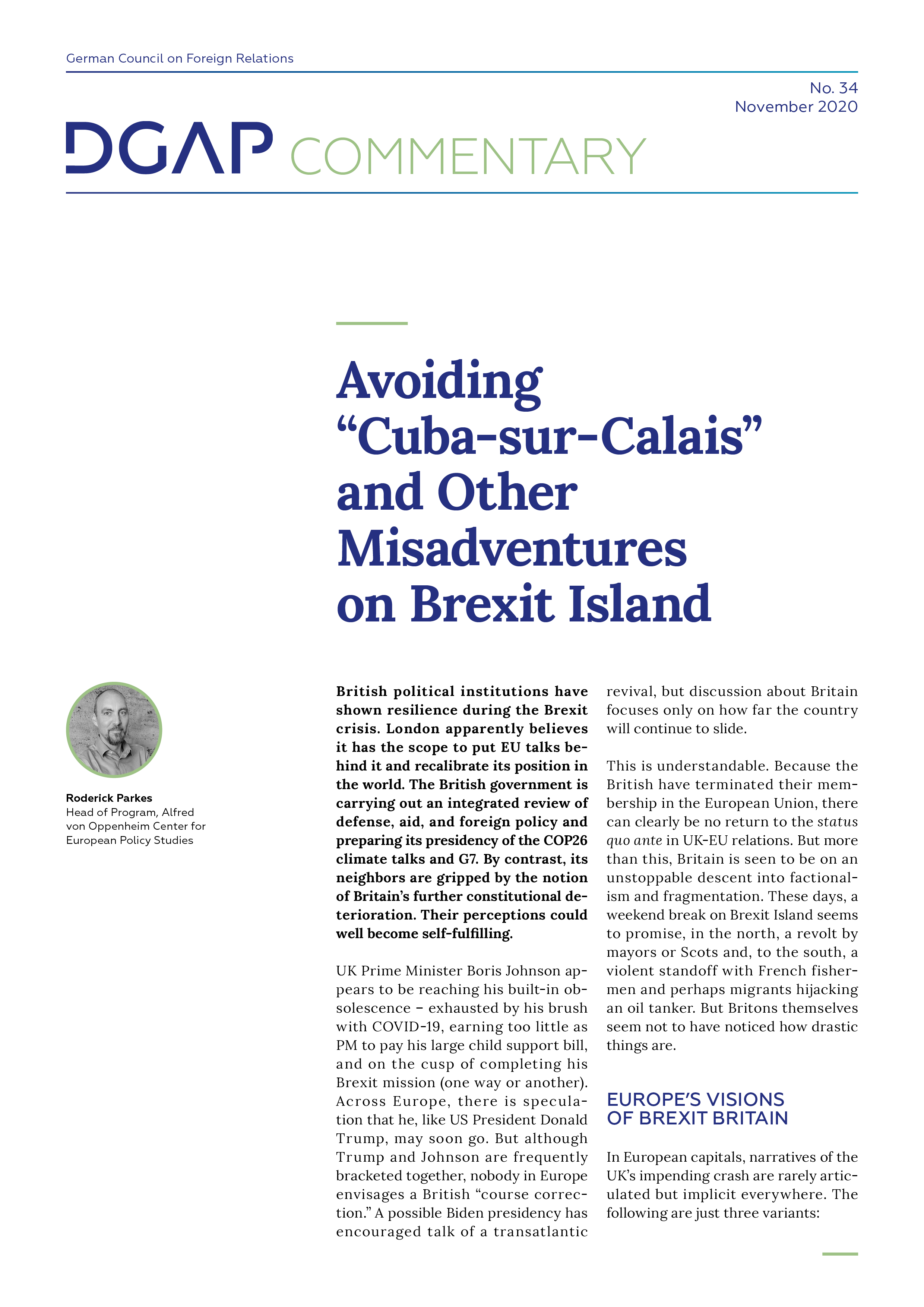UK Prime Minister Boris Johnson appears to be reaching his built-in obsolescence – exhausted by his brush with COVID-19, earning too little as PM to pay his large child support bill, and on the cusp of completing his Brexit mission (one way or another). Across Europe, there is speculation that he, like US President Donald Trump, may soon go. But although Trump and Johnson are frequently bracketed together, nobody in Europe envisages a British “course correction.” A possible Biden presidency has encouraged talk of a transatlantic revival, but discussion about Britain focuses only on how far the country will continue to slide.
This is understandable. Because the British have terminated their membership in the European Union, there can clearly be no return to the status quo ante in UK-EU relations. But more than this, Britain is seen to be on an unstoppable descent into factionalism and fragmentation. These days, a weekend break on Brexit Island seems to promise, in the north, a revolt by mayors or Scots and, to the south, a violent standoff with French fishermen and perhaps migrants hijacking an oil tanker. But Britons themselves seem not to have noticed how drastic things are.
Europe’s Visions of Brexit Britain
In European capitals, narratives of the UK’s impending crash are rarely articulated but implicit everywhere. The following are just three variants:
| Cuba-sur-Calais | West Erdoğanistan | Global Brexit |
|---|---|---|
| The UK becomes an unstable revolutionary island off the coast of the EU – fertile ground for foreign influence operations to destabilize mainland Europe. |
The UK apes the strongman majoritarian democracies of the EU’s southeast, extracting concessions from the EU with the threat of unleashing crime and chaos. |
The UK swiftly loses the vestiges of its former global power status, creating ripples that reach up to the highest international level and out along its web of overseas territories. |
|
The coronavirus pandemic knocked 20 percent off British GDP, exhausting the cash reserves of businesses and unleashing an economic impact even bigger than Brexit. That calamity does not, however, appear to have made the UK’s leaders more risk averse. Quite the opposite. The government is in thrall to a small dissident group of advisors that preaches a revolutionary theory of “disruptive innovation.” Emboldened by COVID-19, this group hopes to jolt the UK’s economy and institutions. Consequently, there is a growing fear in Europe that these ideologues are turning Britain into a poorly-governed offshore hub preyed upon by large outside powers – China or Russia – that use it to influence or destabilize the EU. |
The government led by Prime Minister Theresa May (2016–2019) inched toward Brexit by polarizing society. She used the powers of Britain’s majoritarian democracy, siding with the narrow majority in favor of leaving. When Johnson became PM, he further centralized power. Although the question of EU membership is now settled, the new societal cleavage (by age and education) remains. This split can be clearly seen in the differing opinions on the UK’s coronavirus lockdown as Remain voters resist central government. Some in the EU now see the specter of a polarized majoritarian democracy with permanent single party rule controlling the media and courts. In this case, the UK is a country that leverages its own breakdown to squeeze concessions from the EU – in short, a second Turkey. |
Prior to the Brexit vote, the UK had seemed to have adapted to the modern world and the loss of its imperial status. But, unlike France or Germany, it did so primarily by allying with the US rather than folding itself wholeheartedly into the EU. Now squeezed between the EU and US, and with the wise heads in the Foreign Office sidelined, the UK appears unequal to its inherited legacy. Last year, fears grew that the UK would crash out of the EU only for a radical Labor government to withdraw from NATO and then abolish Britain’s nuclear capability. Today, the fear is more about Johnson’s Britain regressing into a jingoistic mindset and instrumentalizing its old colonial relationships and status in old-style Realpolitik. |
| Current Symptoms: | Current Symptoms: | Current Symptoms: |
|
|
|
How Fears Become Self-fulfilling
These visions of Britain’s future trajectory are, inevitably, based on fears and misperceptions. And such worst-case scenarios have a peculiar habit of becoming self-fulfilling, especially in the hands of the EU. All too often, Brussels deploys its famous “transformative power” on the basis of stereotypes of “the other,” and brings out the worst in its partners. There is a risk that this dynamic will also play out in the UK’s case as illustrated by these responses:
Revolutionary Britain
The EU, because it fears something akin to the Cuba scenario, is pursuing a “thick” trade deal with the UK, offering it access to EU markets under intrusive conditions – notably on state aid but also internal security and foreign policies. Tensions rose in September 2020 following the presentation of the Internal Market Bill: while the UK views the bill as a fallback to protect its autonomy if talks fail, the EU treats it as a gross infringement of international law. As the EU reasserts its trade conditions, its assertiveness may well backfire, encouraging even cautious elements in the UK government to run down the clock on talks. London believes the less time the EU has for the ratification of the deal, the slimmer its demands will be.
Ironically, it is not the revolutionary radicals but rather the large recent intake of risk-averse Conservative MPs from fragile northern cities who will drive Britain into foreign hands. They want the UK to hedge its bets vis-à-vis the EU and seek access to new global markets, raise capital, and attract cheap foreign infrastructure. They do not view the UK as a plaything of global geopolitics, of course. But as they seek transactional deals, they are putting the UK up for sale. Already, the UK appears to have offered defense ties in Central Europe and the Persian Gulf in expectation of sweetheart trade deals. It has also begun using development and humanitarian spending to court international relations. This is fertile ground for China and others.
Strongman Britain
The EU fears that a situation similar to that on its southeastern flank will emerge to its northwest – the UK half in and half out, frozen in limbo. Its fear is primarily of Balkanization; it does not want the responsibility of gluing together the fractious successor states of a “disunited kingdom.” But fearing a new Balkans, the EU could end up creating a second Turkey. The UK is a highly centralized state, but the EU only sees its centrifugal effects: 58 percent of Scots are said to be in favor of independence; 51 percent of the population of Northern Ireland want a referendum on a united Ireland. Its fear of a messy Brexit has led the EU to demand decisive commitments from the UK, backing these demands up with carrots and sticks of its own.
Like Turkey, Britain is a state trying to move away from the EU, seeking to carve out its own strategic environment. Brussels, however, is nevertheless applying the tools of tutelage: it sees no problem in using its economic levers to discipline the UK. Among Leave voters, this amounts to economic warfare and foreign interference; they see support for European engagement as almost treasonous. EU integration, which was meant to settle the UK’s international identity, has polarized it. This anger and polarization diminish the chances of a soft Labor government – with all the benefits that might bring for the devolution of power to the British regions, depoliticization of central administration, and maturing of EU-UK relations.
Brutish Empire
European diplomats fear a return to a retrograde imperial mindset from the UK. They place Britain on the (soft end) of a spectrum with other lost souls such as Turkey and Russia. Faced with neo-imperialism, the EU defers to its member states, allowing old sores to reemerge. Some member states see Brexit as an opportunity to settle old territorial anomalies like Anguilla, Gibraltar, and the Falkland Islands, as well as the Cypriot airbases and even Northern Ireland, particularly since all these territories depend heavily on access to the EU to sustain their economies. Others treat Brexit as a way to increase EU influence in the Arab world, Anglophone West, and East Africa and to establish a rather exclusive form of “EU sovereignty” at the expense of Anglo-Saxon influence.
Ironically, it is the moderate force of the Foreign Office that may begin instrumentalizing the UK’s global status to counter this, trying to prove the UK’s continued value to its European partners. UK diplomats have been dismayed by the shrinking trust of their European partners in international fora. At the UN Security Council, for example, the UK pictures itself as almost the sole honest broker on issues such as Libya. Now, however, there is a risk that the UK squanders this position by keeping tricky topics off the agenda to curry favor with France. Or that it uses its status in NATO, the Conference of Parties that signed the United Nations Framework Convention on Climate Change (COP), or the G7 for the narrow purposes of persuading Europeans to think outside the realm of “EU sovereignty” and include it in their work on security, climate, and the economy.
Correcting Misperceptions
Brexit creates an optical illusion. It distorts the EU’s perception of the world, magnifying its sense of its own power through an unusual David and Goliath battle and reviving an archaic Eurocentric mentality. It recalls an era in which Europeans felt able to carve up world affairs between themselves. Moreover, it almost turns Britain’s deterioration into a matter of prestige for Europe – just as “Brexit contagion” across Europe is a matter of prestige for Britons. All of this serves to distort a simple reality: both the EU and Britain are diminishing themselves. A messy Brexit only shrinks Europe’s weight in the world as influence and capital seep out of London and flow not to the continent but to the rest of the world, notably China.
The rise of China is not an argument in favor of Brussels giving the UK a free pass. Rather, China’s ascendency means that the EU must learn how and when to use its weight, particularly in its proximity abroad. Too often in the past ten years, the EU has complained about being surrounded by an arc of instability – apparently without seeking a causal link to its own system of behavior. The UK, of course, has squandered much political good will in the past months. Even its closest allies in Europe – in the EU’s north and east – view it as a recovering addict who may relapse into its previous erratic behavior. But as with any rehabilitation, there is also a risk in not giving the UK a second chance.
Germany will be vital to any recalibration of relations between Europeans and the UK and not just because it is a big player. Again and again in past weeks, the UK has aligned with German positions – on Turkey, the Middle East, and Libya – often more closely than have Germany’s own EU partners. Moreover and importantly, London says that it is doing so not for the expedient reason of gaining an EU trade deal but because its reading of its interests and values have led it to these positions. It is in Germany’s interest to cooperate with the UK, even if that means acting outside the EU structures and siding against France in its understanding of “European Sovereignty.”



